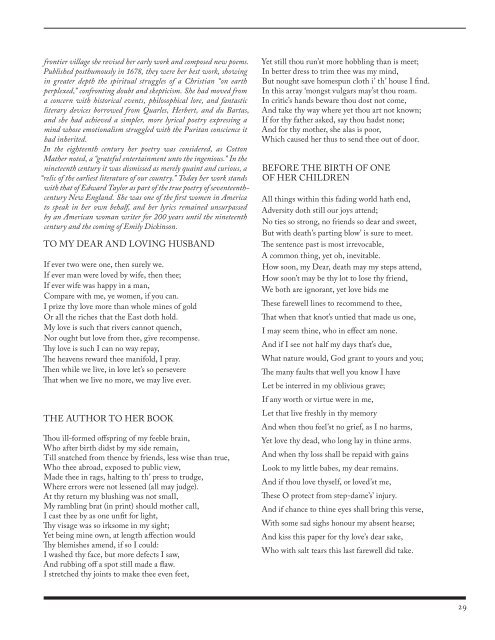fieldston american reader volume i â fall 2007 - Ethical Culture ...
fieldston american reader volume i â fall 2007 - Ethical Culture ...
fieldston american reader volume i â fall 2007 - Ethical Culture ...
- No tags were found...
Create successful ePaper yourself
Turn your PDF publications into a flip-book with our unique Google optimized e-Paper software.
frontier village she revised her early work and composed new poems.Published posthumously in 1678, they were her best work, showingin greater depth the spiritual struggles of a Christian “on earthperplexed,” confronting doubt and skepticism. She had moved froma concern with historical events, philosophical lore, and fantasticliterary devices borrowed from Quarles, Herbert, and du Bartas,and she had achieved a simpler, more lyrical poetry expressing amind whose emotionalism struggled with the Puritan conscience ithad inherited.In the eighteenth century her poetry was considered, as CottonMather noted, a “grateful entertainment unto the ingenious.” In thenineteenth century it was dismissed as merely quaint and curious, a“relic of the earliest literature of our country.” Today her work standswith that of Edward Taylor as part of the true poetry of seventeenthcenturyNew England. She was one of the first women in Americato speak in her own behalf, and her lyrics remained unsurpassedby an American woman writer for 200 years until the nineteenthcentury and the coming of Emily Dickinson.TO MY DEAR AND LOVING HUSBANDIf ever two were one, then surely we.If ever man were loved by wife, then thee;If ever wife was happy in a man,Compare with me, ye women, if you can.I prize thy love more than whole mines of goldOr all the riches that the East doth hold.My love is such that rivers cannot quench,Nor ought but love from thee, give recompense.Thy love is such I can no way repay,The heavens reward thee manifold, I pray.Then while we live, in love let’s so persevereThat when we live no more, we may live ever.THE AUTHOR TO HER BOOKThou ill-formed offspring of my feeble brain,Who after birth didst by my side remain,Till snatched from thence by friends, less wise than true,Who thee abroad, exposed to public view,Made thee in rags, halting to th’ press to trudge,Where errors were not lessened (all may judge).At thy return my blushing was not small,My rambling brat (in print) should mother call,I cast thee by as one unfit for light,Thy visage was so irksome in my sight;Yet being mine own, at length affection wouldThy blemishes amend, if so I could:I washed thy face, but more defects I saw,And rubbing off a spot still made a flaw.I stretched thy joints to make thee even feet,Yet still thou run’st more hobbling than is meet;In better dress to trim thee was my mind,But nought save homespun cloth i’ th’ house I find.In this array ‘mongst vulgars may’st thou roam.In critic’s hands beware thou dost not come,And take thy way where yet thou art not known;If for thy father asked, say thou hadst none;And for thy mother, she alas is poor,Which caused her thus to send thee out of door.BEFORE THE BIRTH OF ONEOF HER CHILDRENAll things within this fading world hath end,Adversity doth still our joys attend;No ties so strong, no friends so dear and sweet,But with death’s parting blow’ is sure to meet.The sentence past is most irrevocable,A common thing, yet oh, inevitable.How soon, my Dear, death may my steps attend,How soon’t may be thy lot to lose thy friend,We both are ignorant, yet love bids meThese farewell lines to recommend to thee,That when that knot’s untied that made us one,I may seem thine, who in effect am none.And if I see not half my days that’s due,What nature would, God grant to yours and you;The many faults that well you know I haveLet be interred in my oblivious grave;If any worth or virtue were in me,Let that live freshly in thy memoryAnd when thou feel’st no grief, as I no harms,Yet love thy dead, who long lay in thine arms.And when thy loss shall be repaid with gainsLook to my little babes, my dear remains.And if thou love thyself, or loved’st me,These O protect from step-dame’s’ injury.And if chance to thine eyes shall bring this verse,With some sad sighs honour my absent hearse;And kiss this paper for thy love’s dear sake,Who with salt tears this last farewell did take.29
















